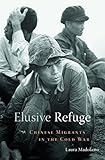Elusive Refuge : Chinese Migrants in the Cold War / Laura Madokoro.
Material type: TextPublisher: Cambridge, MA : Harvard University Press, [2017]Copyright date: ©2016Description: 1 online resource (278 p.) : 5 halftonesContent type:
TextPublisher: Cambridge, MA : Harvard University Press, [2017]Copyright date: ©2016Description: 1 online resource (278 p.) : 5 halftonesContent type: - 9780674973831
- 305.895/10086914
- JV8701
- online - DeGruyter
| Item type | Current library | Call number | URL | Status | Notes | Barcode | |
|---|---|---|---|---|---|---|---|
 eBook
eBook
|
Biblioteca "Angelicum" Pont. Univ. S.Tommaso d'Aquino Nuvola online | online - DeGruyter (Browse shelf(Opens below)) | Online access | Not for loan (Accesso limitato) | Accesso per gli utenti autorizzati / Access for authorized users | (dgr)9780674973831 |
Browsing Biblioteca "Angelicum" Pont. Univ. S.Tommaso d'Aquino shelves, Shelving location: Nuvola online Close shelf browser (Hides shelf browser)

|

|

|

|

|

|

|
||
| online - DeGruyter Elvis’s Army : Cold War GIs and the Atomic Battlefield / | online - DeGruyter Democracy’s Slaves : A Political History of Ancient Greece / | online - DeGruyter This Vast Southern Empire : Slaveholders at the Helm of American Foreign Policy / | online - DeGruyter Elusive Refuge : Chinese Migrants in the Cold War / | online - DeGruyter Once Within Borders : Territories of Power, Wealth, and Belonging since 1500 / | online - DeGruyter On Betrayal / | online - DeGruyter Sources of Knowledge : On the Concept of a Rational Capacity for Knowledge / |
Frontmatter -- Contents -- Abbreviations -- Introduction -- 1. Written Out: The 1951 Convention and Refugees in Asia -- 2. Border Crossing: Migrants and the Refugee Label -- 3. Promoting Refugees: Western Humanitarians in Hong Kong -- 4. Troubled Times: Illegal Migration and the Refugee Subject -- 5. Cold War Visuals: Capturing the Politics of Resettlement -- 6. Navigating Change: Migrants and Regulated Movement -- 7. Humanitarianism in Myth and Practice: From Hong Kong to Indochina -- Epilogue -- Notes -- Bibliography -- Acknowledgments -- Index
restricted access online access with authorization star
http://purl.org/coar/access_right/c_16ec
The 1949 Chinese Communist Revolution is a subject of inexhaustible historical interest, but the plight of millions of Chinese who fled China during this tumultuous period has been largely forgotten. Elusive Refuge recovers the history of China’s twentieth-century refugees. Focusing on humanitarian efforts to find new homes for Chinese displaced by civil strife, Laura Madokoro points out a constellation of factors—entrenched bigotry in countries originally settled by white Europeans, the spread of human rights ideals, and the geopolitical pressures of the Cold War—which coalesced to shape domestic and international refugee policies that still hold sway today. Although the United States, Canada, Australia, New Zealand, and South Africa were home to sizeable Asian communities, Chinese migrants were a perpetual target of legislation designed to exclude them. In the wake of the 1949 Revolution, government officials and the broader public of these countries questioned whether Chinese refugees were true victims of persecution or opportunistic economic migrants undeserving of entry. It fell to NGOs such as the Lutheran World Federation and the World Council of Churches to publicize the quandary of the vast community of Chinese who had become stranded in Hong Kong. These humanitarian organizations achieved some key victories in convincing Western governments to admit Chinese refugees. Anticommunist sentiment also played a role in easing restrictions. But only the plight of Southeast Asians fleeing the Vietnam War finally convinced the United States and other countries to adopt a policy of granting permanent residence to significant numbers of refugees from Asia.
Mode of access: Internet via World Wide Web.
In English.
Description based on online resource; title from PDF title page (publisher's Web site, viewed 24. Aug 2021)


